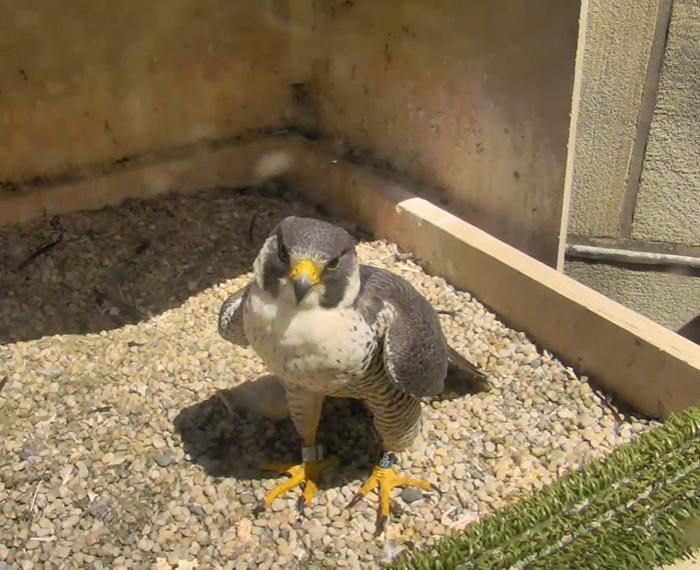
Subscribe to Pittwire Today
Get the most interesting and important stories from the University of Pittsburgh.A new peregrine falcon moved into the Cathedral of Learning

It’s a little early for campus move-in season, but Pitt just got a new raptor resident. Carla, a 3-year-old peregrine falcon, has moved into the nest on the southeast side of the Cathedral of Learning.
Last year, we watched on the National Aviary’s Falcon Nest Cam as female peregrine Morela and her mate Ecco successfully raised three chicks from tiny puffballs of downy feather until they were ready to leave the nest. This week, after a difficult season, Morela stopped appearing on camera. Carla was quick to swoop in.
We talked to Kate St. John, nest monitor and longtime documenter of the falcons on her Outside My Window blog, to learn about what went down this season and what campus birdwatchers can expect next.
What do we know about Carla?
St. John was watching the nest camera when she spotted the newcomer on May 14, along with her identification.
“She was sunning and stretched her left leg forward, and there was the band,” St. John said. “Because she’s banded, we know where she came from, and we know where she’s been.”
Carla was born in 2020 in Fort Wayne, Indiana, and was named for a leader of the utility company that owns the 27-story building on which she was born. More recently she was nesting at West End Bridge in Pittsburgh, and this week she’s been spending time in the Cathedral nest, getting some sun and familiarizing herself with her surroundings.
Although we don’t yet know much about Carla’s personality, St. John assures us that she has a good pedigree. “Peregrine fans who track these birds, who have watched Carla on camera as a chick, are head-over-heels in love with her parents,” she said.
What happened to Morela?
In her three years at the Cathedral nest, Morela had established a routine. This year, things were different.
“Morela typically would lay eggs around mid-March: She was almost like clockwork for St. Patrick’s Day,” said St. John. She started showing signs of getting ready to lay, but March 17 came and went. No eggs.
Meanwhile, there were signs of a drama brewing offscreen. Viewers could see Morela remaining extremely watchful and standing on the edge of the nest. Then she disappeared from the camera for five days.
St. John believes she was fending off a challenge from another female peregrine who wanted the nest for herself. “March is prime time for peregrines who have no territory to challenge those who do to see if they can win it,” she said.
A few days later, Morela was back in the nest, having apparently fended off the challenger, but the stress of the fight had worn her down. She tried to lay an egg for weeks and would stand still with her eyes closed for long periods, looking increasingly sick. It may be that she was “egg-bound,” ready to lay an egg but unable to, which can be dangerous for birds.
“She won the fight, but it probably jammed up her plumbing,” said St. John. “She went downhill. This is what happens in the wild. The hardest part was to see her not be well.”
Finally, she disappeared from the camera and didn’t return. With the nest unoccupied, it was a prime spot for a new resident. Enter Carla.
Why is the Cathedral such a hot spot for falcons, anyway?
There’s a good reason the nest only stayed empty for two days.
In nature, peregrine falcons like to nest on cliffs: Their keen eyesight means they can spot prey from a distance, and the higher they are, the farther they can see. A 42-story landmark that sticks out on the horizon is about as good as it gets, especially if it’s near wooded areas full of birds to hunt.
And much like an Oakland parking spot, there’s fierce competition for the best nests. “There are enough floaters, breeding-age adults who have no territory, that slots get filled pretty fast,” St. John said.
What will happen now?
It’s too late in the season for eggs, so we can’t expect to see Carla raising young this year. So far, she seems to be sticking around and familiarizing herself with her new digs, which aren’t so different from where she was born.
“She’s still getting used to the site, the sounds and what’s going on in the sky,” St. John said. “She’s probably used to the sounds of the city and the sounds of human voices. That’s to her advantage.”
Ecco is still making regular appearance on camera, too. Peregrines are more attached to their nest than they are to their mate. And the two are already beginning to bond: St. John said she’s seen the two in courtship flight at the top of the Cathedral.
2023 may be a bust for eggs on the Cathedral nest cam, but the peregrines make sure it’s never boring.
“They are wonderful,” said St. John. “I’m a birder, but I do have a favorite bird. And it’s hard not to, if you’re around them for any amount of time.”
— Patrick Monahan, screenshot from the National Aviary’s falcon camera

